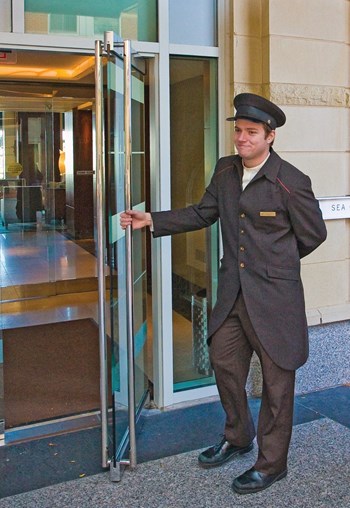
At one point or another, we’ve all felt like this:
I gotta go to the dry cleaners, get the computer fixed, pick up groceries after the ballet recital, wait, a client meeting just popped up, oh, and I have to make reservations for mom’s birthday dinner, still need to get the carpet cleaned. The sink’s broken now? Where did I put my keys?
Sometimes there just isn’t enough of you to go around, and it can be overwhelming. So, where do you turn when you need a few extra pairs of hands? Some condo and co-op residents turn to concierges. There are several different types of concierges, but we’ll focus on independent and residential ones. Before we get deeper into the two, what they do, and how they do it, let’s take a quick look at the history of the profession.
Keeper of the Keys
The word ‘concierge’ is French. It means “keeper of the keys.” In the Middle Ages, a castle’s concierge took care of visiting nobility. He kept the keys to visitors’ rooms and ensured that guests had everything they needed during their visit. People liked the concept, and the trend eventually spread from the castle to all kinds of buildings. Today, the concierges we see most often are ensconced behind desks in the lobbies of high-end hotels—but they’re becoming more commonplace in high-end residential buildings as well.
Independent concierges primarily work as independent contractors. They can help you manage errands from picking up the laundry or groceries, to tracking down the purple python you need to match the décor for your upcoming party—like Nakia Brown, CEO of Manhattan-based Yes, Your Highness! concierge service was once asked to do.
The residential concierges who set up shop in co-op, condo, or luxury rental buildings help residents in lots of other ways, too—like booking restaurant or air travel reservations. Rather than being contracted out by an individual resident, however, they’re contracted out by the board.
Personal Concierges
If you saw Alison Kero, president of Manhattan-based Gotham Concierge LLC, run past you on the street, you might not be able to tell she’s a personal concierge. Kero works out of a home office and doesn’t wear a tasseled jacket. What she does do is handle a slew of hands-on tasks for her clients.
“People come to me to get something done,” she says. “Time is usually a factor.” If there is something that she cannot personally do herself, like fix a badly damaged computer or repair a busted door, she brokers tasks out to other contractors.
She is called based upon her clients’ needs. Some call her frequently. Others need her services on a more limited basis, like during tax season, or quarterly, or even once a year. She bills on an hourly basis.
Brown bills her clients in advance for a block of hours. “One-off services, we bill our client’s credit card after the task is completed. Most one-off tasks are charged a flat-rate.”
In addition to hands-on tasks, Brown’s service helps clients get hard-to-come-by dinner reservations or tickets for shows.
“[Sought-after] restaurant reservations are a little harder to get,” says James Hart, co-owner of Manhattan-based Royale Concierge. “It comes down to networking. Get to know who works the front door at these places and if you send enough business their way, it helps your ability to negotiate.”
Residential Concierges
Hart’s concierge company does most of its work on the residential side. Rather than work independently for individuals, his company is contracted out to cover entire condo or co-op buildings. Among other things, they offer staffing and porter services.
Clients can order anything from maid service, to dry cleaning, to private air travel and vacation packages from residential concierges, which are typically in buildings 24 hours a day or 40 hours a week.
Royale Concierge also offers a virtual service, which gives residents a lot of the same options as an in-house concierge, except they place their orders for services online. The virtual service allows Hart’s company to see what people are ordering and customize the virtual options to best suit specific buildings. Also, a building can have both the in-house and virtual service, or cut costs by just having the virtual service.
Buying in Bulk
Regardless of whether the residential concierge is virtual or real life, the billing is handled pretty much the same way. Residential concierges have a general contract with the building and services are billed directly to the tenant, not through the board.
The costs for a residential concierge service vary greatly depending on the size of building, location and the management company. But, if your management company manages lots of buildings and uses the same residential service for several properties, rates are better.
Discounts for bulk buying apply to the prices concierges can get from their vendors. Servicing a residential building gives residential concierges more sway over pricing. Often, by representing a large group of people, the residential concierge can get cancellation fees waived and other discounts.
One advantage to using a residential service, says Hart, is the security of paying multiple vendors through one credit card. By brokering the wide array of tasks through the concierge service, you essentially make one payment to the concierge service and the service pays the individual vendors.
The Skills
Let’s take a look at some of the skills concierges need to handle such a variety of duties.
“Making every client feels like she or he is the most important person in the world is a trait that a good concierge needs,” says Brown. She also says the job is best suited for people “who like to organize, who enjoy assisting others, and who don’t get bored researching detailed information.”
Research is a necessary part of the job. Hart explains that one of his clients had an antique chest from 1625 and he wanted to find a matching lock. The task required a ton of research, but ultimately the company was able to track down a similar chest and get the lock their client wanted. Beforehand, they told him that they would have to bill hourly for the research and the client agreed. After all, what’s the use of a chest from 1625 with a lock from 1626?
In addition to organization, research, and the attitude to get things done, people skills are mandatory. As Kero points out, “a lot of resources help you get the job done [and] . . . networking certainly makes the job easier.”
The Bizarre
A concierge’s job is very much a jack-of-all-trades position. They get the items or complete tasks according to what their clients need. Usually, the tasks they are asked to complete are pretty ordinary. But every once in awhile, they get something a little trickier (like Hart’s 1625 chest, for example).
Working in her clients’ apartments, Kero says sometimes she deals with people walking around “in various stages of undress.”
In one situation, she was called in by the family of a woman who was a hoarder. The apartment had been taken over by mold. Kero went in for three hours and acted as a mediator. She figured out how the family could deal with the woman in order to get rid of the mold. It was not a pleasant scene.
Sometimes, says Kero, “the job of a concierge is to go in, help someone out, and hope to not get anything nasty on you in the process.”
Brown was once asked by a client to provide a specific brand of organic matzo for a Passover party. The problem was, the matzo was in New York, but the client was in Australia. The request came under such a tight deadline that Brown’s company had to fly a concierge to Australia with the fifteen boxes of matzo.
Every concierge, whether personal or residential, undoubtedly has some bizarre stories. But they’re there to get the job done, pretty much whatever it is (within the law).
As Hart says: “Put us to the test. What do you need? We’ll get it.”
Brendan J. Flaherty is a freelance writer living in Brooklyn.






2 Comments
Leave a Comment